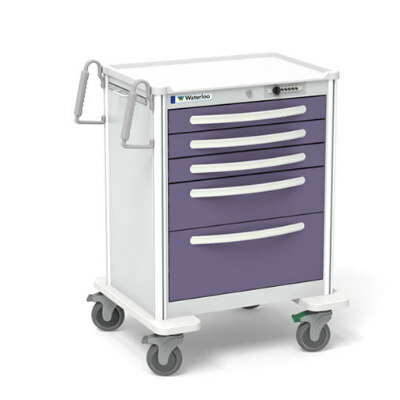AI in Healthcare Diagnosis Market to Witness Substantial Growth Post COVID-19 Pandemic and Reach USD 107.80 Billion by 2027
|
By HospiMedica International staff writers Posted on 18 Jun 2021 |

Illustration
The global Artificial Intelligence (AI) in healthcare market is expected to grow at a CAGR of 49.8% from USD 4 billion in 2019 to USD 107.80 billion by 2027, driven primarily by increasing application of AI in healthcare, growing investments in AI healthcare start-ups, and greater cross-industry partnerships and collaborations. However, the dearth of skilled AI workforce and imprecise regulatory guidelines for medical software are the major factors hampering market growth.
These are the latest findings of ResearchAndMarkets.com (Dublin, Ireland), a market research store.
Cross-industry partnerships are resulting into the introduction of new machine learning models that predict risk and provide cognitive assistance. AI is mostly applied in the clinical trials to obtain accurate and valuable output. For instance, the AI-based tools, such as clinical decision support systems and voice recognition software, help streamline workflow processes in hospitals and improve medical care, thereby enhancing the patient experience. Cross-sector partnerships are among the most dynamic practice within corporate and society relations that bridge various sectors, such as public, private, and nonprofit. The growing number of cross-industry partnerships is anticipated to boost AI adoption in the healthcare sector, which is further expected to fuel the market growth.
The AI in healthcare market is expected to witness substantial growth post-pandemic. The global healthcare infrastructure trends reveal that in order to develop and maintain sustainable healthcare setup, the utilization of computational technologies such as AI becomes crucial. Moreover, a majority of the market players have focused on the development of AI-powered models to fight against the coronavirus pandemic. In addition, several research centers and governments have actively participated in the building of robust AI technologies which are assisting the healthcare professionals to work efficiently even under shortage of resources. These factors will eventually drive the market growth.
Based on component, the software solution segment held a larger share of the AI in healthcare market in 2019 and is estimated to register the highest CAGR during the forecast period. Based on application, the clinical trials segment held the largest share of the global AI in healthcare market in 2019, although the robot assisted surgery segment is expected to register the highest CAGR during the forecast period. The increasing adoption of robotic surgeries due to better surgical outcomes offers lucrative opportunities for the growth of the robotic assisted surgery segment. In terms of end user, the hospitals & healthcare providers segment held the largest share of the AI in healthcare market in 2019 and is estimated to register the highest CAGR during the forecast period.
Related Links:
ResearchAndMarkets.com
These are the latest findings of ResearchAndMarkets.com (Dublin, Ireland), a market research store.
Cross-industry partnerships are resulting into the introduction of new machine learning models that predict risk and provide cognitive assistance. AI is mostly applied in the clinical trials to obtain accurate and valuable output. For instance, the AI-based tools, such as clinical decision support systems and voice recognition software, help streamline workflow processes in hospitals and improve medical care, thereby enhancing the patient experience. Cross-sector partnerships are among the most dynamic practice within corporate and society relations that bridge various sectors, such as public, private, and nonprofit. The growing number of cross-industry partnerships is anticipated to boost AI adoption in the healthcare sector, which is further expected to fuel the market growth.
The AI in healthcare market is expected to witness substantial growth post-pandemic. The global healthcare infrastructure trends reveal that in order to develop and maintain sustainable healthcare setup, the utilization of computational technologies such as AI becomes crucial. Moreover, a majority of the market players have focused on the development of AI-powered models to fight against the coronavirus pandemic. In addition, several research centers and governments have actively participated in the building of robust AI technologies which are assisting the healthcare professionals to work efficiently even under shortage of resources. These factors will eventually drive the market growth.
Based on component, the software solution segment held a larger share of the AI in healthcare market in 2019 and is estimated to register the highest CAGR during the forecast period. Based on application, the clinical trials segment held the largest share of the global AI in healthcare market in 2019, although the robot assisted surgery segment is expected to register the highest CAGR during the forecast period. The increasing adoption of robotic surgeries due to better surgical outcomes offers lucrative opportunities for the growth of the robotic assisted surgery segment. In terms of end user, the hospitals & healthcare providers segment held the largest share of the AI in healthcare market in 2019 and is estimated to register the highest CAGR during the forecast period.
Related Links:
ResearchAndMarkets.com
Latest Business News
- Johnson & Johnson Acquires Cardiovascular Medical Device Company Shockwave Medical
- Mindray to Acquire Chinese Medical Device Company APT Medical
- Olympus Acquires Korean GI Stent Maker Taewoong Medical
- Karl Storz Acquires British AI Specialist Innersight Labs
- Stryker to Acquire French Joint Replacement Company SERF SAS
- Medical Illumination Acquires Surgical Lighting Specialist Isolux
- 5G Remote-Controlled Robots to Enable Even Cross-Border Surgeries

- International Hospital Federation Announces 2023 IHF Award Winners
- Unprecedented AI Integration Transforming Surgery Landscape, Say Experts

- New WHO Guidelines to Revolutionize AI in Healthcare
- Getinge Acquires US-Based Medical Equipment Provider Healthmark Industries
- Global Surgical Lights Market Driven by Increasing Number of Procedures
- Global Capsule Endoscopy Market Driven by Demand for Accurate Diagnosis of Gastrointestinal Conditions
- Global OR Integration Market Driven by Need for Improved Workflow Efficiency and Productivity
- Global Endoscopy Devices Market Driven by Increasing Adoption of Endoscopes in Surgical Procedures
- Global Minimally Invasive Medical Devices Market Driven by Benefits of MIS Procedures
Channels
Artificial Intelligence
view channel
AI-Powered Algorithm to Revolutionize Detection of Atrial Fibrillation
Atrial fibrillation (AFib), a condition characterized by an irregular and often rapid heart rate, is linked to increased risks of stroke and heart failure. This is because the irregular heartbeat in AFib... Read more
AI Diagnostic Tool Accurately Detects Valvular Disorders Often Missed by Doctors
Doctors generally use stethoscopes to listen for the characteristic lub-dub sounds made by heart valves opening and closing. They also listen for less prominent sounds that indicate problems with these valves.... Read moreCritical Care
view channel
Powerful AI Risk Assessment Tool Predicts Outcomes in Heart Failure Patients
Heart failure is a serious condition where the heart cannot pump sufficient blood to meet the body's needs, leading to symptoms like fatigue, weakness, and swelling in the legs and feet, and it can ultimately... Read more
Peptide-Based Hydrogels Repair Damaged Organs and Tissues On-The-Spot
Scientists have ingeniously combined biomedical expertise with nature-inspired engineering to develop a jelly-like material that holds significant promise for immediate repairs to a wide variety of damaged... Read more
One-Hour Endoscopic Procedure Could Eliminate Need for Insulin for Type 2 Diabetes
Over 37 million Americans are diagnosed with diabetes, and more than 90% of these cases are Type 2 diabetes. This form of diabetes is most commonly seen in individuals over 45, though an increasing number... Read moreSurgical Techniques
view channel
Miniaturized Implantable Multi-Sensors Device to Monitor Vessels Health
Researchers have embarked on a project to develop a multi-sensing device that can be implanted into blood vessels like peripheral veins or arteries to monitor a range of bodily parameters and overall health status.... Read more
Tiny Robots Made Out Of Carbon Could Conduct Colonoscopy, Pelvic Exam or Blood Test
Researchers at the University of Alberta (Edmonton, AB, Canada) are developing cutting-edge robots so tiny that they are invisible to the naked eye but are capable of traveling through the human body to... Read more
Miniaturized Ultrasonic Scalpel Enables Faster and Safer Robotic-Assisted Surgery
Robot-assisted surgery (RAS) has gained significant popularity in recent years and is now extensively used across various surgical fields such as urology, gynecology, and cardiology. These surgeries, performed... Read morePatient Care
view channelFirst-Of-Its-Kind Portable Germicidal Light Technology Disinfects High-Touch Clinical Surfaces in Seconds
Reducing healthcare-acquired infections (HAIs) remains a pressing issue within global healthcare systems. In the United States alone, 1.7 million patients contract HAIs annually, leading to approximately... Read more
Surgical Capacity Optimization Solution Helps Hospitals Boost OR Utilization
An innovative solution has the capability to transform surgical capacity utilization by targeting the root cause of surgical block time inefficiencies. Fujitsu Limited’s (Tokyo, Japan) Surgical Capacity... Read more
Game-Changing Innovation in Surgical Instrument Sterilization Significantly Improves OR Throughput
A groundbreaking innovation enables hospitals to significantly improve instrument processing time and throughput in operating rooms (ORs) and sterile processing departments. Turbett Surgical, Inc.... Read moreHealth IT
view channel
Machine Learning Model Improves Mortality Risk Prediction for Cardiac Surgery Patients
Machine learning algorithms have been deployed to create predictive models in various medical fields, with some demonstrating improved outcomes compared to their standard-of-care counterparts.... Read more
Strategic Collaboration to Develop and Integrate Generative AI into Healthcare
Top industry experts have underscored the immediate requirement for healthcare systems and hospitals to respond to severe cost and margin pressures. Close to half of U.S. hospitals ended 2022 in the red... Read more
AI-Enabled Operating Rooms Solution Helps Hospitals Maximize Utilization and Unlock Capacity
For healthcare organizations, optimizing operating room (OR) utilization during prime time hours is a complex challenge. Surgeons and clinics face difficulties in finding available slots for booking cases,... Read more
AI Predicts Pancreatic Cancer Three Years before Diagnosis from Patients’ Medical Records
Screening for common cancers like breast, cervix, and prostate cancer relies on relatively simple and highly effective techniques, such as mammograms, Pap smears, and blood tests. These methods have revolutionized... Read morePoint of Care
view channel
Critical Bleeding Management System to Help Hospitals Further Standardize Viscoelastic Testing
Surgical procedures are often accompanied by significant blood loss and the subsequent high likelihood of the need for allogeneic blood transfusions. These transfusions, while critical, are linked to various... Read more
Point of Care HIV Test Enables Early Infection Diagnosis for Infants
Early diagnosis and initiation of treatment are crucial for the survival of infants infected with HIV (human immunodeficiency virus). Without treatment, approximately 50% of infants who acquire HIV during... Read more
Whole Blood Rapid Test Aids Assessment of Concussion at Patient's Bedside
In the United States annually, approximately five million individuals seek emergency department care for traumatic brain injuries (TBIs), yet over half of those suspecting a concussion may never get it checked.... Read more













